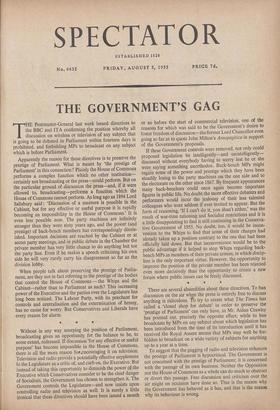THE GOVERNMENT'S GAG
THE Postmaster-General last week issued directives to the BBC and ITA confirming the position whereby all discussion on wireless or television of any subject that is going to be debated in Parliament within fourteen days is prohibited, and forbidding MPs to broadcast on any subject which is before Parliament.
Apparently the reason for these directives is to preserve the prestige of Parliament. What is meant by `the prestige of Parliament' in this connection? Plainly the House of Commons performs a complex function which no other institution— certainly not broadcasting or the press—could perform. But on the particular ground of discussion the press—and, if it were allowed to, broadcasting—performs a function which the House of Commons cannot perform. As long ago as 1894 Lord Salisbury said : 'Discussion of a measure is possible in the Cabinet, but for any effective or useful purpose it is rapidly becoming an impossibility in the House of Commons.' It is even less possible now. The party machines are infinitely stronger than they were sixty years ago, and the power (and prestige) of back-bench members has correspondingly dimin- ished. Important decisions are reached by the Cabinet or at secret party meetings, and in public debate in the Chamber the private member has very little chance to do anything but toe the party line. Even if he makes a speech criticising his own side he will very rarely carry his disagreement so far as the division lobby.
When people talk about preserving the prestige of Parlia- ment, are they not in fact referring to the prestige of the bodies that control the House of Commons — the Whips and the Cabinet—rather than to Parliament as such? This increasing power of the Executive and the parties over the Legislature has long been noticed. The Labour Party, with its penchant for controls and centralisation and the extermination of heresy, has no cause for worry. But Conservatives and Liberals have every reason for alarm.
Without in any way usurping the position of Parliament, broadcasting gives an opportunity for the balance to be, to some extent, redressed. If discussion 'for any effective or useful purpose' has become impossible in the House of Commons, there is all the more reason fot•imicouraging it on television. Television and radio provide a potentially effective supplement to the Legislature as a critic of, and curb on, the Executive. But instead of taking this opportunity to diminish the power of the Executive which Conservatives consider to be the chief danger of Socialism, the Government has chosen to strengthen it. The Government controls the Legislature—and now insists upon controlling radio and television as well. It is surely a little ironical that these directives should have been issued a month or so before the start of commercial television, one of the reasons for which was said to be the Government's desire to foster freedom of discussion—the former Lord Chancellor even going so far as to quote John Milton's Areopagitica in support of the Government's proposals.
If these Government controls were removed, not only could proposed legislation be intelligently—and unintelligently— discussed without everybody having to worry lest he or she were saying something unorthodox. Back-bench MPs might regain some of the power and prestige which they have been steadily losing to the party machines on the one side and to the electorate on the other since 1867. By frequent appearances many back-benchers could once again become important figures in public life. No doubt the more effective debaters and performers would incur the jealousy of their less talented colleagues who were seldom if ever invited to appear. But the form of reasoning, 'If I can't do it, you shan't either,' was the result of war-time rationing and Socialist restrictions and it is a little disappointing to find it still continuing in the Conserva- tive Government of 1955. No doubt, too, it would be incon- venient to the Whips to find that some of their charges had already taken up a position contrary to the one that had been officially laid down. But that inconvenience would be to the public advantage if it helped to stop Whips regarding back- bench MPs as members of their private armies, in which discip- line is the only important virtue. However, the opportunity to improve the position of the private member has been rejected even more decisively than the opportunity to create a new forum where public issues can be freely discussed.
There are several absurdities about these directives. To ban discussion on the air when the press is entirely free to discuss anything is ridiculous. to try to create what The Times has called a 'closed shop for debate' in order to preserve the `prestige of Parliament' can only have, as Mr. Aidan Crawley has pointed out, precisely the opposite effect; while to ban broadcasts by MPs on any subject about which legislation has been introduced from the time of its introduction until it has received the Royal Assent means that MPs may well be for- bidden to broadcast on a wide variety of subjects for anything up to a year at a time.
To suggest that the gagging of radio and television enhances the prestige of Parliament is hypocritical. The Government is not concerned with the prestige of Parliament; it is concerned with the passage of its own business. Neither the Opposition nor the House of Commons as a whole can do much to obstruct or divert this passage. Free discussion and criticism over the air might on occasion have done so. That is the reason why the Government has behaved as it has, and that is the reason why its behaviour is wrong.


































 Previous page
Previous page